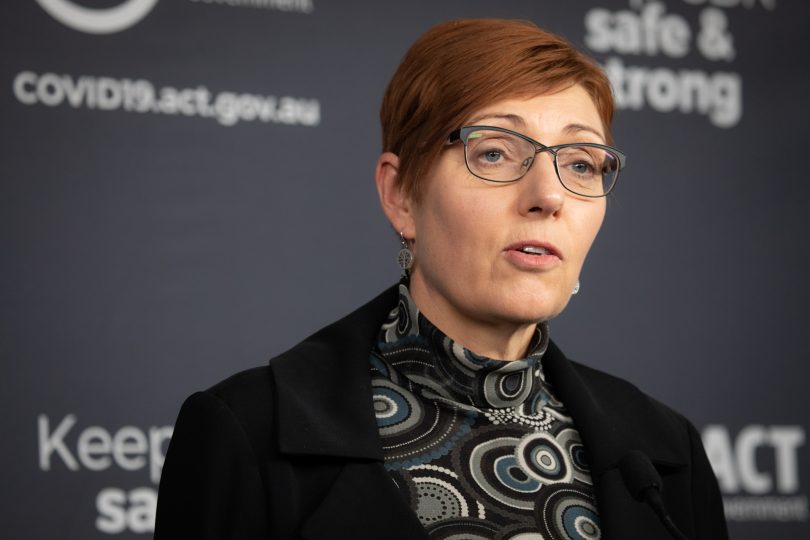
Minister for Health Rachel Stephen-Smith has urged the Commonwealth to introduce a vaccination mandate for disability support staff. Photo: Michelle Kroll.
Health Minister Rachel Stephen-Smith has criticised the Commonwealth Government for failing to adequately protect the disability community by mandating vaccination for workers in the sector, particularly in high-risk settings like residential care homes.
Disability workers are not currently included on the list of mandated occupations for vaccination in the ACT. Senator Linda Reynolds is the minister responsible for the NDIS and the National Disability Insurance Scheme Act and exercises statutory powers, including making NDIS rules and directing the NDIA.
Ms Stephen-Smith used today’s press briefing to express her frustration that the matter wasn’t being dealt with at National Cabinet level where the Commonwealth could agree to legislate on screening workers for vaccination under the NDIS Act.
The Australian Health Protection Principal Committee continues to work on the issue, which had been expected to come before National Cabinet on 1 October but has been delayed.
Ms Stephen-Smith said while the matter was complex for individual jurisdictions, it was open to the Commonwealth to use its powers under the act, but it had “steadfastly completely refused to take this step”.
The Commonwealth’s powers would not capture all disability workers but would capture residential care settings, day programs and other activities managed by registered providers under the NDIA. The ACT was considering options that might be available to protect people living with disabilities from the virus.
Vaccination rates in the disability sector lag behind the community in general, despite being higher on average in the ACT than in many other jurisdictions. People living with disabilities are significantly more likely to suffer severe illness if they contract COVID-19.
The ACT Government has been attempting to reach the disability community through various means, including in-reach vaccination clinics and an access and sensory clinic at the Weston Creek walk-in centre.
“We can see Canberrans with a disability coming forward for vaccination, but these numbers still sit behind the wider community and that is really concerning”, Ms Stephen-Smith said.
Among the Territory’s NDIS clients, 76.9 per cent have had their first dose of vaccine and 59.6 per cent are fully vaccinated, while across the community in general, 95 per cent of Canberrans have had an initial vaccine dose and 66 per cent are fully vaccinated.
“To be quite frank, public health directions are not a long term solution to this problem,” Ms Stephen-Smith said, describing the Commonwealth’s lack of action as “extremely disappointing”.
The issue of vaccination for both workers and people living with a disability is complex because care often takes place in private residential home and the minister described “real challenges” around an individual’s right to determine who visits their homes.
She said the disability community was entitled to know whether a care worker was vaccinated and people could elect to refuse care from an unvaccinated worker. Vaccination across the sector would significantly reduce risks for everyone, given that even fully vaccinated people could transmit the virus during the close contact required in disability care.
Peak health bodies have requested that vaccinations mandates be considered for a number of other health workers in the future, including allied health providers.
Ms Stephen-Smith said this could also be challenging because many allied health providers worked for smaller privately owned independent operators, often providing services in people’s homes. She said it is open to private employers to require their own staff to be vaccinated.
“We are actively considering what we should do and how we should do it”, Minister Stephen Smith said. “It is disappointing that this is not prioritised as a National Cabinet item by the Prime Minister.
“This reflects the ongoing attitude to supporting people with a disability that continues to be extremely disappointing, not taking up their responsibility to get people vaccinated early in Phase 1a and now putting this issue on the back burner”, she said.





















